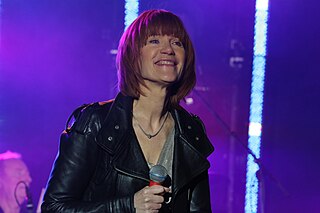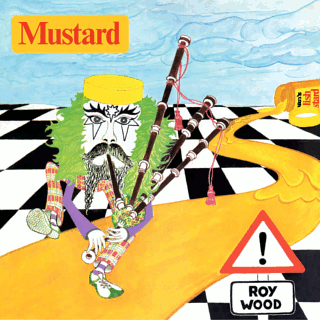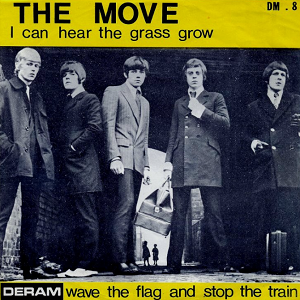Related Research Articles

The Electric Light Orchestra (ELO) is an English rock band formed in Birmingham in 1970 by songwriters and multi-instrumentalists Jeff Lynne and Roy Wood with drummer Bev Bevan. Their music is characterised by a fusion of pop and classical arrangements with futuristic iconography. After Wood's departure in 1972, Lynne became the band's sole leader, arranging and producing every album while writing nearly all of their original material. From this point until their first break-up in 1986, Lynne, Bevan, and keyboardist Richard Tandy were the group's only consistent members.

Roy Wood is an English musician, singer and songwriter. He was particularly successful in the 1960s and 1970s as member and co-founder of The Move, Electric Light Orchestra and Wizzard.

Wizzard were an English rock band formed by Roy Wood, former member of the Move and co-founder of the Electric Light Orchestra. The Guinness Book of 500 Number One Hits states, "Wizzard was Roy Wood just as much as Wings was Paul McCartney." They are most famous for their 1973 Christmas single "I Wish It Could Be Christmas Everyday".

Nicola James Capaldi was an English singer-songwriter and drummer. His musical career spanned more than four decades. He co-founded the progressive rock band Traffic in 1967 with Steve Winwood with whom he co-wrote the majority of the band's material. He was inducted into the Rock and Roll Hall of Fame as a part of Traffic's original lineup.

Pauline Matthews, better known by her stage name Kiki Dee, is an English pop singer. Known for her blue-eyed soul vocals, she was the first female singer from the UK to sign with Motown's Tamla Records.

The Thrills are an Irish rock band, formed in 2001 in Dublin, Ireland. The band was founded by lead vocalist Conor Deasy and guitarist Daniel Ryan, guitarist and bass player Padraic McMahon, pianist Kevin Horan and drummer Ben Carrigan. Their break came with their debut album, So Much for the City, which became an Irish number one and charted at number 3 in the UK. The band's sound has been described as "inspired by classic American pop of the late '60s and early '70s" by Rovi and "an ocean-soaked, harmony-heavy homage to California's dreamy dreams, shaking ground, and unrelenting sunshine" by Pitchfork Media.

All I Can Do is the seventeenth solo studio album by American singer-songwriter Dolly Parton. It was released on August 16, 1976, by RCA Victor. The album was co-produced by Parton and Porter Wagoner and would be the last of Parton's solo albums to have any involvement from Wagoner. It was nominated for Best Country Vocal Performance, Female at the 19th Annual Grammy Awards. The album spawned three singles: "Hey, Lucky Lady", "All I Can Do", and "Shattered Image".

Mustard is the second solo album by English musician Roy Wood, released in December 1975 by Jet Records. The album was recorded at De Lane Lea Studios and Phonogram Studios, although a dispute at one of the studios delayed the release of the album. Produced and entirely performed by Wood, who also designed the album artwork, Mustard was a departure from his previous solo album Boulders (1973), with a more ambitious approach and denser, more layered production, again mixing a number of musical styles. Annie Haslam and Phil Everly contributed guest vocals to the album, while Wood's influences on the record included the Andrew Sisters, the Beach Boys and Led Zeppelin.

Move is the debut album by British rock group the Move, released in March 1968 through Regal Zonophone Records. The album features ten Roy Wood compositions, along with three covers which had been a prominent part of the group's live act. Although scheduled for an earlier release, the album was delayed by the theft of the master tapes, which led to the tracks needing to be re-recorded. The album was sporadically recorded between January 1967 and February 1968 at Advision, De Lane Lea and Olympic Studios in London, during gaps in their tight recording schedule when the group were not booked for any performances.

Boulders is the debut solo album by English musician Roy Wood, recorded from 1969 to 1971 and released in July 1973 by Harvest Records. Wood began work on the album as a whimsical side-project away from his band the Move, and conceived it to explore numerous instruments he had collected in the 1960s but felt unable to use in the Move. Nonetheless, its release was delayed for several years due to his busy schedule with the Move, Wizzard and the Electric Light Orchestra. Apart from harmonium on one song played by John Kurlander, all the instruments on the album, including guitars, cello, saxophones, bouzouki, banjo and recorders, were played by Wood, who also wrote, arranged, and produced the whole record, in addition to providing all the vocals. The musician also painted the unfinished self-portrait on the cover.

"Do Ya" is a song written by Jeff Lynne, that was originally recorded by The Move, which became a hit for the Electric Light Orchestra in 1977.

"I Wish It Could Be Christmas Every Day" is a Christmas song recorded by British glam rock band Wizzard. It was first released in December 1973 and, as with most Wizzard songs, was written and produced by the band's frontman Roy Wood—formerly of The Move and a founding member of Electric Light Orchestra. Despite the song's strong, long-lasting popularity, it has reached no higher than number four on the UK Singles Chart, a position it occupied for four consecutive weeks from December 1973 to January 1974. The song was beaten to the 1973 Christmas Number 1 spot by Slade's "Merry Xmas Everybody", which remained at the top of the charts for five weeks, from December 1973 to January 1974.

"I Can Hear the Grass Grow " is the second single by the Move, written by Roy Wood. The song was first released on 31 March 1967, and reached number 5 in the UK Singles Chart on 10 May 1967, staying for ten weeks in the charts. "I Can Hear the Grass Grow" was the second of a string of four consecutive top-5 singles in the UK.
"Let the Good Times Roll" is a song that was recorded by Shirley and Lee in 1956. This song was written by the duo, Shirley Goodman and Leonard Lee.

"Rock On" is a song written by English singer David Essex. Recorded in 1973 and released as a single by Essex, it became an international hit. In 1989, American actor and singer Michael Damian recorded a cover version that went to number one on the Billboard Hot 100 chart. The song has been recorded many times, including a 2006 version by the English hard rock group Def Leppard.
"Gonna Make You an Offer You Can't Refuse" is a song written in 1973 by John Worth, a pseudonym used by John Worsley. It was originally sung by the American soul singer Jimmy Helms, and the track was arranged by Mike Moran. The single was issued by Cube Records in the UK.
"Forever" is a 1973 single, which was written and produced by Roy Wood. Wood played all of the musical instruments on the recording, as well as supplying lead and multi-tracked backing vocals. The song was globally published by Carlin Music Corp.
"Goin' Down the Road" is a 1974 single, which was written and produced by Roy Wood. Wood played all of the musical instruments on the recording, including the bagpipes, as well as supplying lead and multi-tracked backing vocals. The single bore the subtitle "(A Scottish Reggae Song)". The song was globally published by Carlin Music Corp.
"Oh What a Shame" is a 1975 single, which was written and produced by Roy Wood. Wood played all of the musical instruments on the recording, as well as supplying lead and multi-tracked backing vocals. The song was jointly globally published by Carlin Music Corp and Roy Wood Music. One music journalist described the track as "a delightful collision of The Beach Boys and Neil Sedaka".
References
- ↑ "Boulders - Roy Wood | Songs, Reviews, Credits". AllMusic . Retrieved 22 August 2019.
- ↑ "Dear Elaine / Songs of Praise by Roy Wood". Rateyourmusic.com. Retrieved 22 August 2019.
- 1 2 "Face The Music - ROY WOOD: BOULDERS - REVIEWS". Ftmusic.com. Retrieved 22 August 2019.
- ↑ "DEAR ELAINE - TRO ESSEX Music Group". Troessexmusic.com. Retrieved 22 August 2019.
- 1 2 Roberts, David (2006). British Hit Singles & Albums (19th ed.). London, England: Guinness World Records Limited. p. 610. ISBN 1-904994-10-5.
- ↑ "ROY WOOD | full Official Chart History | Official Charts Company". Officialcharts.com. Retrieved 22 August 2019.
- ↑ Bonner, Michael (19 January 2012). "Roy Wood – Music Box". Uncut.co.uk. Archived from the original on 3 June 2019. Retrieved 2 June 2019.
- ↑ "The Slow Sound from Roy". Middlesex Country Times: 8. 3 August 1973.
- ↑ "Roy Wood", Record Collector , July 1994
- ↑ "Dear Elaine - Roy Wood | Song Info". AllMusic . Retrieved 22 August 2019.
- ↑ "Dear Elaine - Roy Wood | Song Info". AllMusic . Retrieved 22 August 2019.
- ↑ "Singles - Roy Wood | Songs, Reviews, Credits". AllMusic . Retrieved 22 August 2019.
- ↑ "Roy Wood - New Songs, Playlists & Latest News - BBC Music". BBC. Retrieved 22 August 2019.